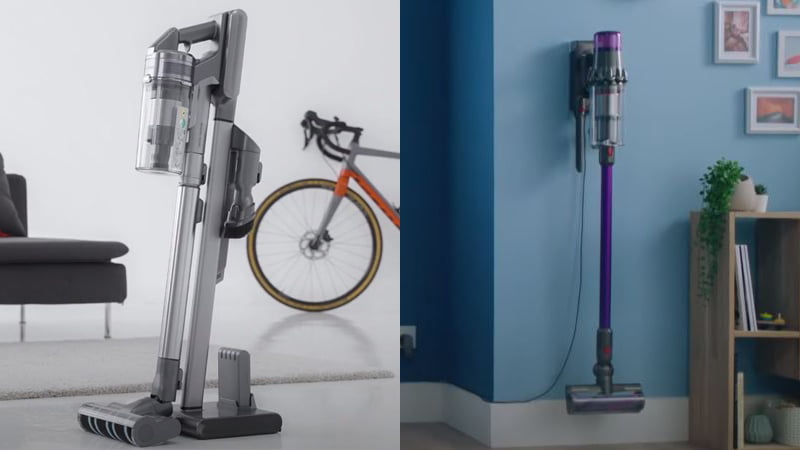Samsung Jet 90 Vs Dyson V11 Torque Drive – This article will delve into the nuanced differences in features, performance, and utility between these two powerhouses, assisting you in making the most informed choice.
The Samsung Jet 90 is a real beast, boasting an extraordinary suction power of up to 200 AW. Better yet, with two cleaning heads and a wide range of useful attachments, it can easily adapt to any cleaning scenario. Its self-standing station also easily piqued my interest since I prefer to avoid drilling into walls.
For those who are fond of the Dyson brand but prefer not to splurge on their latest models, the Dyson V11 Torque Drive presents itself as a compelling choice. What particularly stands out about this option? Remarkable suction power, impressive cleaning performance, and the ability to automatically adjust suction to adapt to surface type.
Samsung Jet 90 Vs Dyson V11 Torque Drive: Comparison Chart




Samsung Jet 90 Vs Dyson V11 Torque Drive: Differences
I would call this battle a tie. Let’s delve further into my comparison and review to gather more comprehensive insights and information!
Design & Usability
Winner: Samsung Jet 90
Attachments & Storage
| Samsung Jet 90 | Dyson V11 Torque Drive |
|---|---|
| Turbo Action Brush Soft Action Brush Extension Crevice Tool Combination Tool Mini Motorized Tool Flexible Tool Z charging station Removable battery (x1) | High Torque cleaner head Stubborn dirt brush Mini soft dusting brush Combination tool Mini Motorized tool Crevice tool Wand storage clip Docking station and charger Removable battery (x1) |
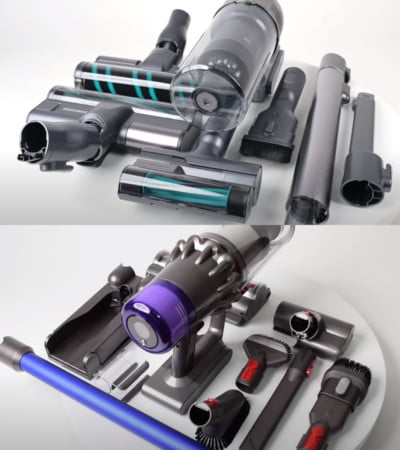
One aspect of the Samsung Jet 90’s attachments that I truly appreciated was the inclusion of a self-standing charging station. While it may require some assembly on your part, rest assured that the process is straightforward and hassle-free. Once fully assembled, it has a fancy and elegant appearance with a Z shape, earning it the fitting name of the “Z charging station.”
I’m glad it has a dedicated charging slot for the spare battery (which needs to be purchased separately) and doesn’t require wall drilling. My only gripe is that it can only hold two attachments, so I had to store the rest in a nearby cupboard. In addition, it has a rather large footprint, which can pose a challenge for individuals in small apartments to find an ideal spot to place it.
Another notable feature of the Jet 90 is its telescopic wand, which allowed me to adjust the vacuum’s length according to my specific cleaning needs. Alternatively, I can also collapse it for more compact storage. One of the models I tested, which also incorporates a similar telescopic wand, is the CordZero A9 Ultimate.
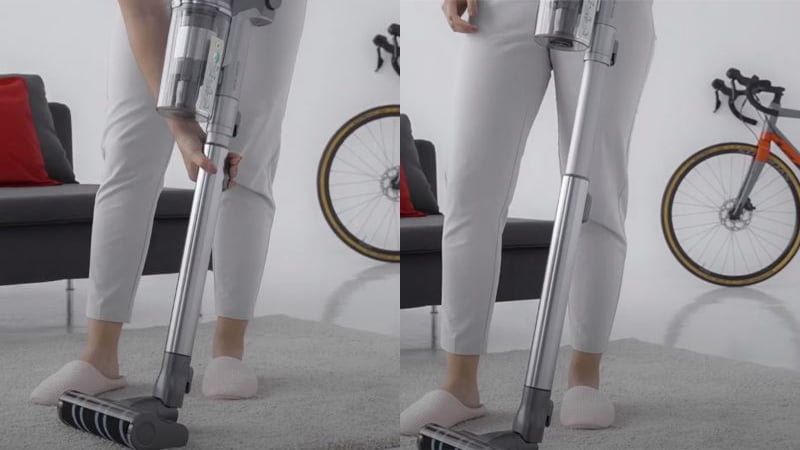
Similar to its counterparts and many other cord-free stick vacuums, the Dyson V11 includes a convenient wall-mounted charging station. After taking a few DIY steps to screw it onto the wall near an outlet, you will have a safe spot to charge the vacuum and store two attachments.
It is a great storage solution to keep the vacuum out of reach of your furry companions or little ones and keep your floor clutter-free. However, if you, like me, prefer to preserve the pristine look of your walls, fret not. An alternative option is to directly plug the charger into the battery and safely store the remaining components in a suitable place, such as a cupboard.
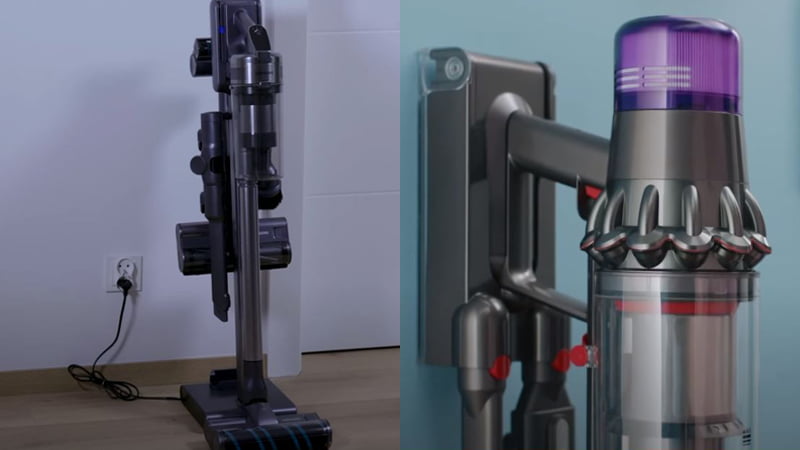
Weight & Maneuverability
The Samsung Jet 90 vs Dyson V11 Torque Drive weigh 6.2 and 6.7 pounds, respectively, showcasing minimal differences in terms of weight. They generally felt lightweight in my hands, but I’ve still found some users complaining about how heavy they are. Perceived heaviness can vary depending on individual strength and age, so perhaps they are old men or physically weak people.
Maneuvering these machines and carrying them up/down stairs was a breeze for me. In the portable handheld configuration, they are significantly lighter, and I could use them to clean overhead and hard-to-reach areas for long periods of time without hand fatigue.
These machines were also very easy to get under furniture, although this did require me to crouch down. Also, it would be better if they were equipped with headlights to help detect any dust and dirt in those dark places.
Battery Life
The Samsung Jet 90 vs Dyson V11 Torque Drive boasts an impressive advertised battery life of up to 60 minutes. However, it’s important to note that achieving this maximum battery life is highly dependent on usage conditions. In practice, using the vacuum with the floorhead attachment, which is typically the most used tool, and operating it at higher power settings will inevitably result in a faster depletion of the battery compared to the advertised duration. After conducting tests using the main nozzle for both vacuums, here are the results I obtained:
| Samsung Jet 90 | Dyson V11 | |
|---|---|---|
| Maximum Battery Life | ≈ 42 mins | ≈ 54 mins |
| Minimum Battery Life | ≈ 10 mins | ≈ 9 mins |
| Charging Time | ≈ 3.5 hours | ≈ 4 hours |
Although the vacuums didn’t reach the advertised battery life, they came remarkably close when operating at the lowest power setting. For a small single-floor apartment, a fully charged battery should be sufficient. However, having two batteries becomes crucial to ensuring uninterrupted cleaning sessions if you reside in a larger space, such as a mammoth-sized apartment.
The Samsung Jet 90 has a removable battery, so the spare must be purchased separately. With two batteries in hand, just park the vacuum in the charging station, insert the additional battery into the charging slot, and you essentially have two batteries getting charged simultaneously.
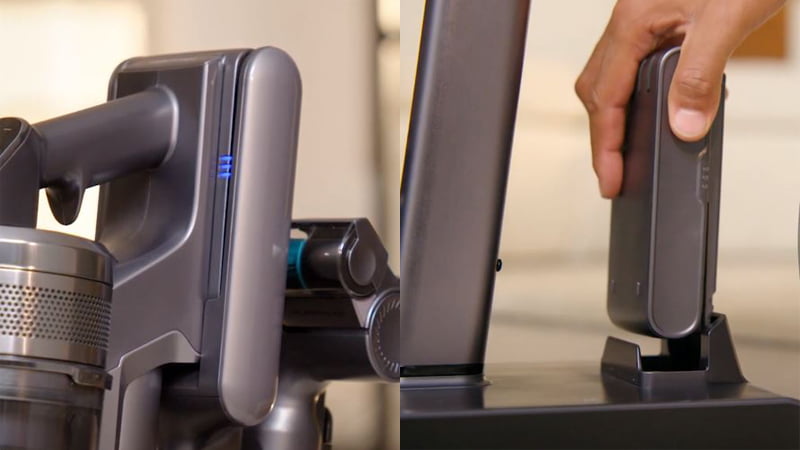
Likewise, the additional battery for the Dyson V11 also needs to be purchased separately. Unfortunately, its wall mount doesn’t provide space for accommodating a spare battery, meaning you must charge the two batteries alternately.
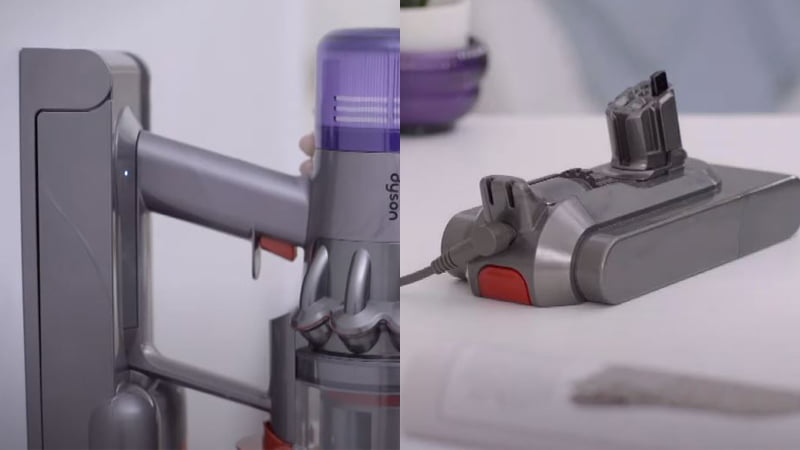
Cleaning Performance
Winner: Tie
Suction Power & Floorhead
The Samsung Jet 90 boasts an exceptional maximum suction power of up to 200 AW when operating at its highest power setting. Meanwhile, the Dyson V11 offers a slightly lower but still highly impressive suction power of 185 AW, somewhere between the Dyson V15 (230 AW) and the V12 (150 AW).
Both the Samsung Jet 90 vs Dyson V11 Torque Drive come with a pair of floorheads, including a soft roller and a multi-surface brush roll – one is only for hard floors and the other works best on carpets.
Hard Floor
Both machines worked superbly on this type of surface. The Samsung Jet 90, paired with its soft roller (known as Soft Action Brush), effortlessly collected all the debris in a single pass, as is typical for models equipped with this type of roller – that is common in models equipped with this type of roller.
On the other hand, the Dyson V11 also captured almost all the fine and small debris without any hassle and splashed a small amount forward. To pick up all the bulkier materials, I had to fully open two gates on its nozzle (by sliding the slider to the “+” position) and slightly wiggle the vacuum.
Carpet
On my low-pile carpet, the Samsung Jet 90 left only approximately 1% of large debris and easily captured around 91% of smaller particles in just one pass. Switching to the high-pile carpet, this one collected all the large debris but left approximately 6% of the smaller materials behind.
The Dyson V11 had slightly better performance – 100% debris of all sizes was easily gathered on my low-pile carpet, leaving no residue behind. Also, on my high-pile carpet, only a tiny amount of large debris (1%) remained.
Hair Test
Both the Samsung Jet 90 vs Dyson V11 Torque Drive easily and quickly picked up all the hair from various surfaces. But I found the Dyson V11’s multi-surface cleaning head to be a bit better at anti-tangle, reducing the maintenance burden. Specifically, only a small amount of longer hair stayed on its roller.
In the case of the Jet 90, although its soft roller didn’t encounter hair wrap issues, I noticed that a notable amount of hair became tangled on its multi-surface floorhead— that is a common challenge faced by models that lack anti-tangle technology.
Dust Cup & Filtration System
Winner: Tie
The Samsung Jet 90 features a 0.8-liter dustbin, while the Dyson V11’s dust cup is slightly smaller at 0.75 liters. Emptying the second one is a breeze thanks to the “Point and Shoot” mechanism: push a red lever down to eject the collected dust and dirt. I found myself having to do a few up-and-down motions to remove everything.
However, emptying the Jet 90 canister is a bit “Heath Robinson-esque.” The entire emptying process includes removing the dustbin completely from the handheld part, removing the top filter, detaching the cyclone, and ultimately turning it upside down.
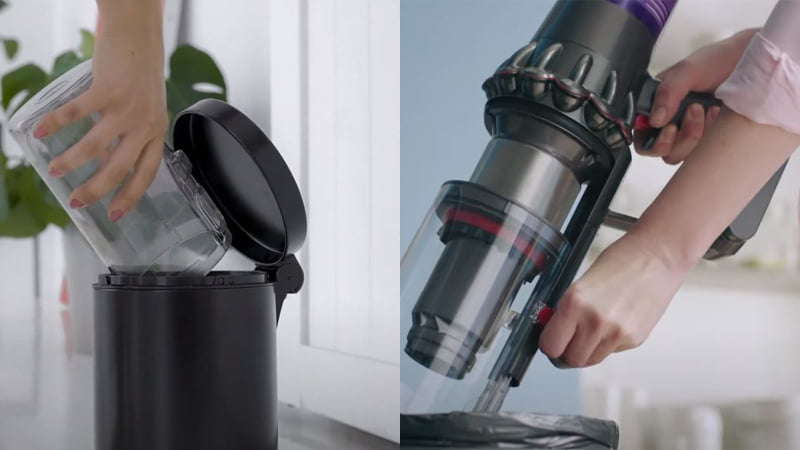
However, the good news is that you don’t have to go through this intricate process, thanks to Clean Station, which is designed to simplify this process. All you need to do is place the dust cup atop the tower. Then all contents will be automatically transferred to a disposable dust bag inside. After a few emptying cycles, this bag will require replacing with a new one. I also found a HEPA-level filter hidden in this tower, which will also need regular cleaning. If you are interested in this clean station, you will need to spend more money on the Samsung Jet 90 Complete.
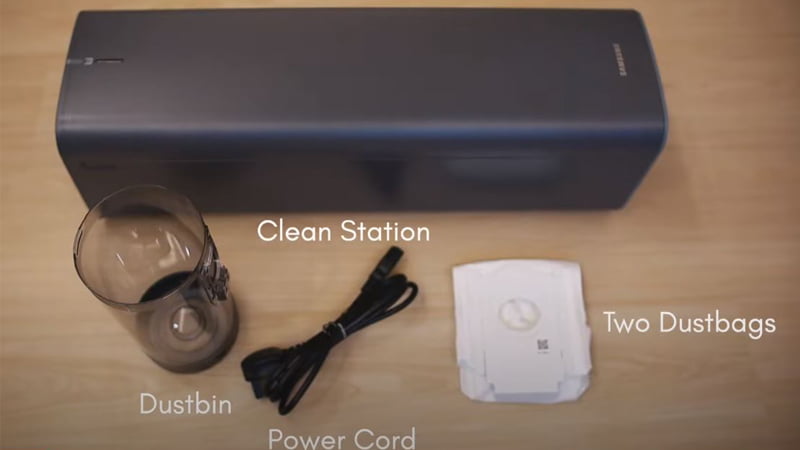
Regarding the filtration system, the Dyson V11 boasts a fully sealed system, ensuring unfiltered air passes through filters before it is released. Thanks to that, its HEPA filter will completely trap all the vacuumed dirt and allergens. This filter is washable and should be rinsed with water whenever the LCD screen alerts you.
The Samsung Jet 90 sports a 5-layer filtration system that is quoted as being able to trap up to 99.999% of allergens and microdust particles. This filtration system consists of a cyclone, a micro filter, and an exhaust HEPA filter. It’s worth noting that all of them, except for the HEPA-level filter, are washable. To clean the HEPA filter, gently tapping it over a trash can is recommended to dislodge and remove all the accumulated dust and dirt.
Utilities
Winner: Dyson V11
User Interface & Control Method
Since Dyson V11, except for the V11 Animal version, all Dyson sticks are equipped with an advanced LCD screen that sits on the top of the handheld unit. It provided me with a convenient way to stay informed about the vacuum’s status regarding battery level and the selected power mode during use.
While this design has its advantages, it also presents a trade-off. On the positive side, it helps optimize the vacuum’s battery life by allowing power usage only when necessary. But it can lead to hand fatigue, particularly during extended cleaning sessions. To switch between power modes, just press a small button located on the display.
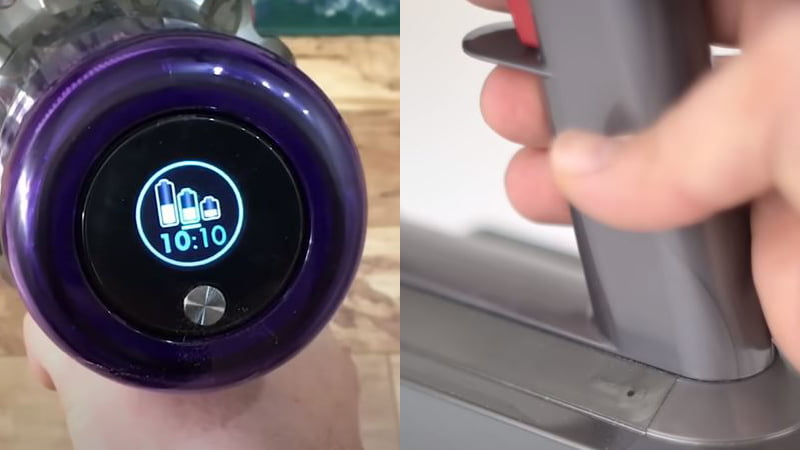
On the other hand, the Jet 90 sports an eye-catching digital screen that displays the current mode and alerts related to clogging or maintenance. The sole drawback of this display, arguably the biggest, is the absence of an estimated battery life indicator. Instead, I had to rely on the trio of tiny LEDs located on the battery to estimate the battery level myself.
Regarding its control method, there are three physical buttons near the display: the biggest one to turn on/off the vacuum and two on either side to switch between modes.
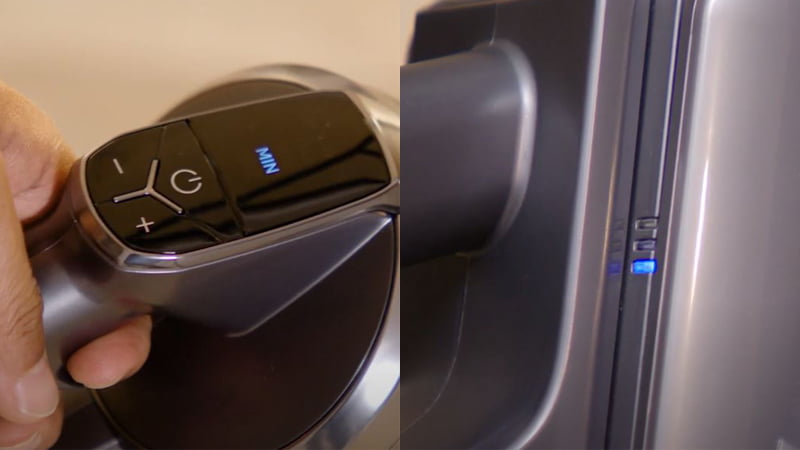
Power Mode
Besides the basic “Eco” and “Boost” modes, the Dyson V11 has an “Auto” mode where it can automatically adjust its suction power based on the surface type detected by the Dynamic Load Sensor (DLS). It is worth noting that this sensor is located on the main nozzle. So if you use this one with any accessory, auto mode will be disabled and replaced with “Med” mode.
The Samsung Jet 90 has four modes: Min, Mid, Max, and Wet. The last mode is only available when this model is used as a mop by pairing it with the mop attachment (Spinning Sweeper). However, you will need to purchase this part separately if you want. Is it worth it? I found it only worked on not-so-dirty surfaces, meaning it’s far from replacing a dedicated mop.
Quick Rundown Of Samsung Jet 90
- DUAL CHARGING AND 60 MIN BATTERY LIFE - Use your vacuum for up to 60 minutes of uninterrupted cleaning before a recharge is needed; easily swap the battery with a spare, plus you can charge two batteries at once with the Dual Charging Station in just 3.5 hours. Brush Width: 8.5 inch.Specific uses:hard floor,carpet,dual action
- ADVANCED PERFORMANCE - Clean hardwood, tile, and carpeting thanks to the vacuum’s 200 Air Watts of intense suction power
- LIGHTWEIGHT DESIGN - Built to go around your home with ease at a mere 6 pounds and with four length adjustments; the Jet 90 makes it easy to vacuum stairs, reach beneath sofas or appliances, clean high cabinets, window blinds and more
- TURBO ACTION BRUSH - Rotating more than 3,700 times a minute and with 180° swivel flexibility, the Turbo Action Brush cleans dust, hair, and other debris on multiple surfaces
- JET CYCLONE - Keep debris from building up on the filter with the powerful multi-cyclonic system that pushes dirt into the dustbin. Dust Capacity- 0.8 L
Quick Rundown Of Dyson V11 Torque Drive
- Twice the suction of any cord-free vacuum. Up to 60 minute run time in Eco mode with full charge.
- High Torque cleaner head intelligently adapts to different floor types in Auto mode
- LCD screen displays run time countdown and machine performance in real time
- Dyson Digital motor V11 helps deliver 40% more suction power than the Dyson V8 cord-free
- Whole-machine filtration captures 99.97% of microscopic dust particles as small as 0.3 microns
Product Videos
Related Articles to Samsung Jet 90
- Dyson V7 Vs Samsung Jet 90: Side-by-Side Vacuum Comparison
- Samsung Jet 60 Vs Jet 90: Which Vacuum Is Better & More Versatile?
- Samsung Jet 70 Vs 90: What Is The Better Product To Otp For Whole Apartment Cleaning?
- Samsung Bespoke Jet Vs Jet 90 Complete: Which Performs Better?
- Samsung Jet 90 Vs Jet 75: A Head-To-Head Comparison
- Roborock H7 vs Samsung Jet 90: Honest Review and Detailed Comparison
- Samsung Jet 90 Vs Dyson V12: A Head-To-Head Comparison
Related Articles to Dyson V11
- Electrolux Pure Q9 Vs Dyson V11: The Awesome Debate
- Dyson V11 Torque Drive vs Torque Drive Plus: Unveiling The Differences And Choosing The Right Model For You
- Proscenic P11 vs Dyson V11: Which Is Your Best Bet?
- Dyson V11 Torque Drive Vs V10 Animal: An Honest Cleaning Power Comparison
- Dyson V8 Animal Vs V11 Torque Drive: Design and Convenience Showdown
- Dreame V11 vs Dyson V11: Comparable Quality At Different Prices
- Tineco Pure One S11 vs Dyson V11: A Comprehensive Comparison
- Samsung Jet 75 Pet Vs Dyson V11: Which Vacuum Cleaner Has A Greater Advantage?
- Samsung Jet 75 vs Dyson V11: Which Is The Better Buy?
- Hoover H-FREE 500 vs Dyson V11: Honest Reviews And Detailed Comparison
- Vorwerk Kobold Vk200 vs Dyson V11: Both Are Potent Vacuums, But There Is Only 1 Winner!
- Karcher VC4s vs Dyson V11: Let’s Choose The Vacuum That Best Fits Your Needs
- Miele Triflex HX1 vs Dyson V11: Which Is Your Best Best?
- Dyson V7 vs V11: Which One Is Right For You?
- Tineco S11 vs Dyson V11: A Battle Between Well-known Cordless Stick Vacuums
- The Only Dyson V11 vs Philips 8000 Comparison You Need!
- Kogan Z11 vs Dyson V11: Which Vacuum Is Worth The Money?
- JIMMY JV85 Pro vs Dyson V11: Dyson Encounters A Serious Opponent
- Xiaomi G11 vs Dyson V11: Which Is The Better One?
- Samsung Jet 60 Vs Dyson V11: Discover The Best Vaccum
- Xiaomi Jimmy JV83 Vs Dyson V11: The Ultimate Face-off Between Powerhouse Vacuums
- Tineco A11 Vs Dyson V11 – Which Vacuum Cleaner Reigns Supreme?
- Samsung Bespoke Jet Vs Dyson V11: A Head-To-Head Comparison
- Dyson V8 vs V11: What’s the Best Bang for Your Buck?
- Dyson V12 vs V11: Ultimate Side-by-side Comparison
- Tineco S12 Vs Dyson V11: Which Is The Better Cordless Vacuum?
- Xiaomi G10 Vs Dyson V11: Discover Your Perfect Vacuum Match
- Kobold VB100 Vs Dyson V11: Which Vacuum Cleaner is Worth Your Investment?
- Dyson V10 vs V11: Which Should You Buy?
- Xiaomi V10 vs Dyson V11: A Head-To-Head Comparison
References:
- Samsung Jet 90: https://www.samsung.com/us/home-appliances/vacuums/jet-stick/jet-90-cordless-stick-vacuum-with-turbo-action-brush-in-titan-chrometal-vs20r9046t3-aa/
- Dyson V11 Torque Drive: https://www.dyson.com/vacuum-cleaners/cordless/v11/torque-drive/nickel-blue

Victor K. Giles is a leading consultant and expert in vacuum cleaner technology with over a decade of experience. As a mechanical engineering graduate in the University of Michigan, he specializes in product development, design optimization, and performance analysis. Victor collaborates with manufacturers and educates consumers, making her a sought-after guest speaker at industry events. His work has been featured in renowned publications, and he shares his expertise on his blog, “The Vacuum Teria”. Victor’s passion for cleaner, healthier living spaces drives his to help clients choose the best vacuum solutions for their needs.
